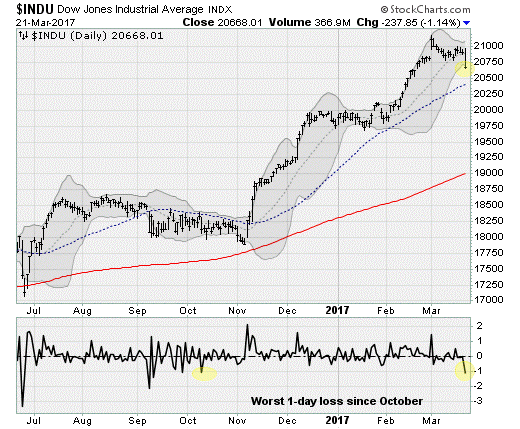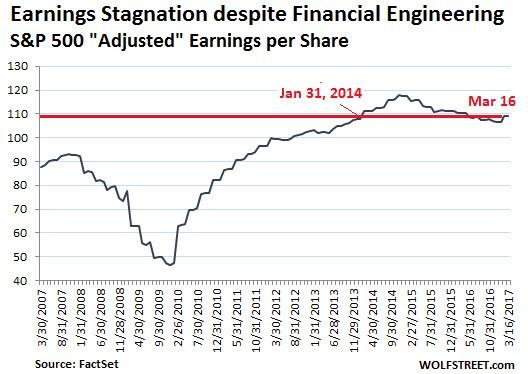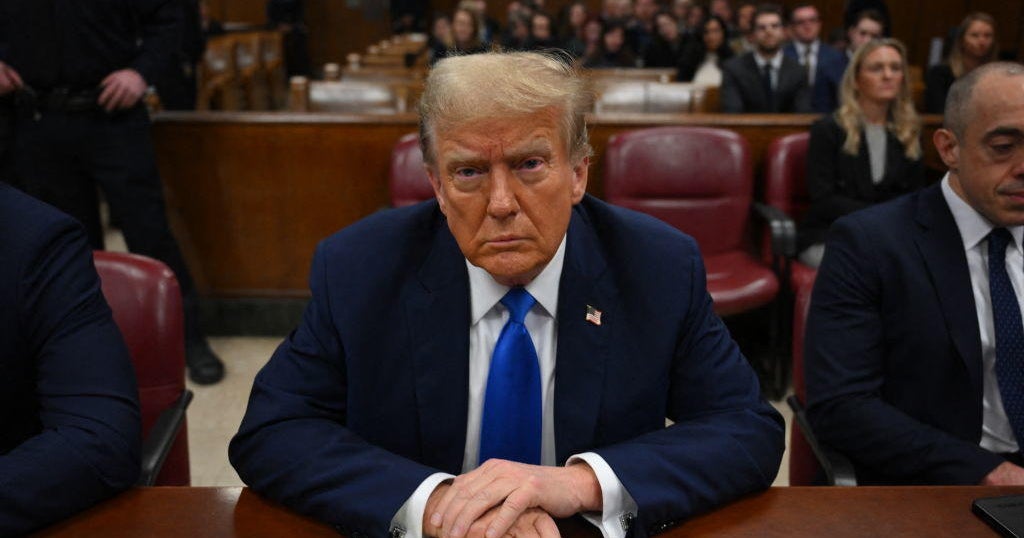Air is rushing out of the post-election stock bubble
The streak is over. For the first time in 110 sessions -- going all the way back to October -- large-cap stocks suffered a loss of more than 1 percent on Tuesday. All at once, the overconfident and overextended bulls were suddenly reminded that, yes, stock prices can actually fall.
And they can fall hard: The day’s losses wiped out a month of gains (chart below).
The catalyst was growing apprehension about legislative gridlock in Washington as prospects remain uncertain for President Trump’s health care reform efforts ahead of a House of Representatives vote, possibly on Thursday. With conservative members of the House lukewarm, and Democrats frigid, this jeopardizes any push on tax reform and infrastructure spending this year -- things that investors had aggressively priced into equity prices since Election Day.
Air is rushing out of the post-election sentiment bubble that was all based on hopes of lower corporate taxes, a cash-repatriation holiday to bring back funds held overseas and the promise of stimulus spending on infrastructure and military hardware.
The facts on the ground are much different. Key measures such as corporate profits have stalled. And with “hard” economic data points like retail sales soft, the Atlanta Fed’s GDPNow estimate of first-quarter growth is a pitiful 0.9 percent. Plus, the Federal Reserve is aggressively hiking interest rates.
In fact, corporate earnings haven’t gone anywhere over the last three years (chart above).
The drop in crude oil prices also undermines the post-election “reflation” theme as OPEC further loses control of the market and U.S. shale producers ramp up activity following last November’s supply freeze agreement by the oil cartel.
Two areas are getting hit particularly hard in the downdraft: Bank and retail stocks.
For retailers, just look at the 45 percent decline suffered by Bebe Stores (BEBE) on Tuesday after reports that the company will close its physical stores and attempt a turnaround as an online brand. This provides yet another indication that something is wrong with the American consumer amid weak overall retail sales and troubles at retailers like Target (TGT).
Bank of America Merrill Lynch turned its recommendation on the entire consumer-discretionary sector to “market weight” on Monday, citing the negative impact of rising wages on profit margins and noting the group is the most negatively correlated to inflation, which is now rising. Credit Suisse also downgraded the group, citing overly optimistic valuations.
For banks, the thinking following the election was that Mr. Trump’s policies would rev up the economy, ease regulatory burdens and bolster profitability via the higher long-term interest rates that would surely result from all this. As a result, the KBW Bank Index surged nearly 40 percent from early November into the high set earlier this month. Now, it’s testing its December-January lows. A breakdown here would risk a reversal of much of the recent gains.
Sentiment is souring as long-term interest rates have drifted lower over the past week as the bond market worries the Federal Reserve short-term rate hike last Wednesday could be a policy mistake. That is, instead of pushing long-term rates higher (and widening the gap between loan and deposit rates) the Fed could be tightening too soon into a weak and fragile economy. That could push the country into a new recession and force long-term interest rates even lower as weaker GDP growth and lower inflation is priced into Treasury bonds.
Moreover, members of Mr. Trump’s Cabinet echo his support during the campaign for a reinstatement of aspects of the Depression-era Glass-Steagall Act that separated commercial and investment banking activities and was ditched in the 1990s. This suggests the president could be open to doing something about Wall Street’s unresolved “too-big-to-fail” problem.
Overall, much depends on the legislative success of the health care reform efforts in Congress this week. But from a purely technical perspective, the stock market’s Tuesday sell-off looks very similar to the big drop on Sept. 9 that ended the long calm investors enjoyed last summer and presaged three months of preelection volatility.






